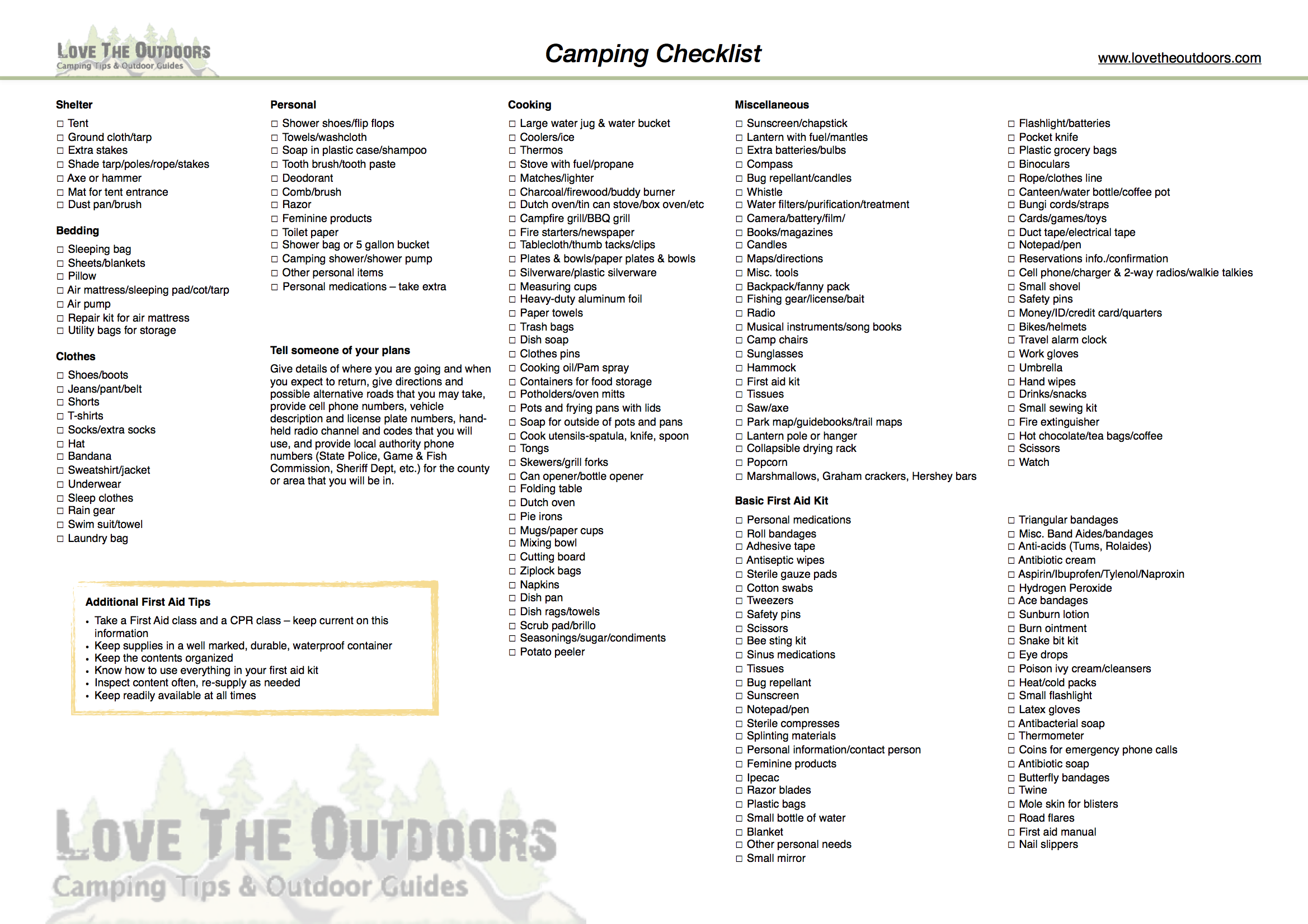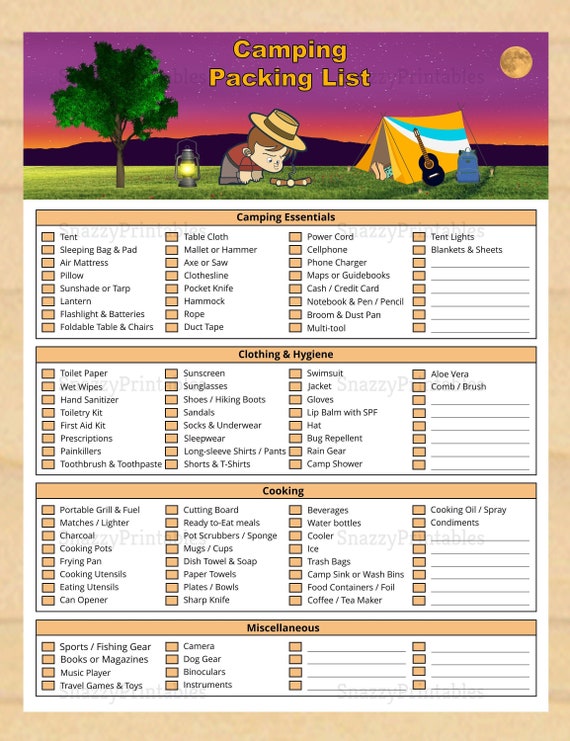Pack a tent, sleeping bag, cooking gear, food, water, clothing, and first aid for camping. Include navigation tools, emergency supplies, and personal items on your checklist.
Embarking on a camping adventure demands meticulous preparation to ensure an enjoyable and safe experience. A well-thought-out camping list is essential, as it serves as your blueprint for packing all the necessary gear and supplies. Seasoned campers and novices alike benefit from a comprehensive checklist that covers shelter, sustenance, attire, and safety essentials.
This list not only helps in organizing your pack but also minimizes the chances of forgetting critical items. Remember, your camping trip’s success hinges on the gear you bring along, so prioritize the checklist and tailor it to your specific needs, considering the duration of your trip and the natural environment you’ll be exploring. With this approach, you’re setting the stage for a memorable outdoor excursion.

Credit: www.lovetheoutdoors.com
The Essence Of A Well-packed Camping Kit
The Essence of a Well-Packed Camping Kit is crucial for a successful outdoor adventure. A thoughtfully assembled kit ensures you enjoy nature without setbacks. Proper gear selection can make or break your camping experience.
The Role Of Preparation In Outdoor Success
Preparation is the foundation of any successful camping trip. Knowing your destination’s weather, terrain, and wildlife is key. This knowledge dictates what you pack. A well-prepared camper is a happy camper.
- Weather forecast: Pack suitable clothing and shelter.
- Terrain type: Choose appropriate footwear and equipment.
- Wildlife: Bring necessary safety gear and food storage containers.
Key Considerations Before Packing
Before you start packing, consider the length of your trip, group size, and activities planned. These factors influence what you need to bring.
| Factor | Consideration |
|---|---|
| Trip Length | Amount of food, water, and clothing |
| Group Size | More supplies and larger equipment |
| Activities | Specific gear for each activity |
Pack essentials first: shelter, water, food, and clothing. Add specialized gear next. Always double-check your list before leaving.
Shelter And Comfort In The Wilderness
Imagine waking up to the sound of birds and the sight of trees. In the wilderness, shelter and comfort matter most. A good night’s sleep starts with the right gear. Let’s make sure you have the essentials for a cozy stay in nature.
Choosing The Right Tent
Size, weather resistance, and ease of setup guide your tent choice. Think about your group’s size and the season. A four-season tent withstands harsh weather. A lightweight tent is perfect for backpacking. Ensure it has ventilation for airflow and sturdy poles for stability.
- Capacity: Choose a tent that fits your group plus gear.
- Seasonality: Pick a tent designed for the weather you’ll encounter.
- Features: Look for tents with pockets and gear lofts for organization.
Sleeping Bags And Pads For A Good Night’s Sleep
Insulation and comfort are key for sleeping bags and pads. The right sleeping bag keeps you warm. A pad provides cushioning from the ground.
| Sleeping Bag | Sleeping Pad |
|---|---|
|
|
Pick a bag with a snug fit to trap body heat. Choose a pad that suits your sleep style. Side sleepers need more cushioning. Back sleepers might prefer a firmer pad.
Dressing For The Great Outdoors
Stepping into the wilderness requires the right attire. Proper clothing is crucial for comfort and safety. This section helps you pack smart for your next adventure.
Layering Strategies For Variable Weather
Changing weather can be a challenge outdoors. Layering is the key to staying warm and dry. Here’s how to do it:
- Base Layer: Wicks sweat off your skin.
- Middle Layer: Insulates and retains heat.
- Outer Layer: Shields from wind and rain.
Remember, layers should be easy to add or remove as temperatures change.
Footwear To Keep You Moving
Your feet take you everywhere. Choosing the right footwear is essential for any terrain. Consider these points:
| Type | Feature | Use |
|---|---|---|
| Hiking Boots | Ankle support, durability | Rough terrain |
| Trail Shoes | Lightweight, flexible | Moderate walks |
| Sandals | Breathable, quick-dry | Water activities |
Select footwear that matches your activities and fits well to avoid blisters.

Credit: www.etsy.com
Nutrition On The Trail
Nutrition on the Trail is vital for a successful camping adventure. Your body needs fuel to hike, explore, and enjoy the wilderness. Choosing the right foods can make all the difference. They must be lightweight, non-perishable, and packed with energy. Let’s dive into the best food selections and the cookware necessary to prepare them.
Portable And Nutrient-dense Food Selections
Smart food choices are crucial for maintaining high energy levels. Focus on foods that are both portable and nutrient-dense. This means picking items that are easy to carry and rich in nutrients. Below is a list of food types to include on your packing checklist.
- Trail Mix – A blend of nuts, seeds, and dried fruits.
- Energy Bars – Compact and come in various flavors.
- Jerky – High in protein and doesn’t require refrigeration.
- Peanut Butter – Great source of fat and protein.
- Instant Oatmeal – Easy to prepare with hot water.
- Dehydrated Meals – Just add water for a full meal.
These items are not only easy to pack but also provide the necessary energy to keep you going.
Cookware Essentials For Campsite Meals
Preparing meals at your campsite can be a fun and rewarding experience. You’ll need the right cookware essentials to make cooking easy and enjoyable. Here’s a list of the basic cookware items to bring along:
| Item | Use |
|---|---|
| Portable Stove | Heats water and cooks meals. |
| Pots and Pans | For boiling and frying food. |
| Utensils | Including spoons, forks, knives, and spatulas. |
| Reusable Dishes | Eco-friendly option for serving food. |
| Collapsible Sink | Makes cleaning up easier. |
| Biodegradable Soap | For washing dishes without harming the environment. |
Pack these essentials to ensure you have everything needed to cook and enjoy your meals outdoors.
Staying Hydrated In The Wild
Before you dive into the wilderness, it’s crucial to plan for hydration. Your body needs water to function, especially outdoors. Let’s explore how you can stay hydrated while embracing nature’s beauty.
Water Filtration And Purification Systems
Water sources in the wild are not always safe. To ensure you have access to clean drinking water, consider these tools:
- Pump filters – Easy to use and can filter many liters of water.
- UV water purifiers – Small gadgets that kill bacteria and viruses with light.
- Gravity filters – Fill it and hang it; gravity does the work for you.
- Chemical tablets – Compact and lightweight, perfect for emergency use.
Each system has its benefits, so pick one that fits your trip and space in your pack.
Hydration Packs And Water Bottle Must-haves
Carrying water should be convenient and accessible. Here’s what to pack:
| Item | Feature |
|---|---|
| Hydration packs | Hands-free sipping and large volume. |
| Insulated water bottles | Keep liquids cool or hot for hours. |
| Collapsible bottles | Save space when empty. |
| Water bladders | Fit in your backpack and hold a good supply. |
Opt for BPA-free materials and consider bottles with built-in filters for added safety.
Tools And Gadgets For Camping Efficiency
Every camper knows that smart packing makes camping better. Choosing the right tools and gadgets can save space and enhance your outdoor experience. Here, we focus on some essentials that should be on every camper’s checklist.
Multi-tools And Knives: Versatility At Hand
Multi-tools and knives are camping essentials. They perform various tasks with one compact tool. Look for options that include:
- Scissors
- Screwdrivers
- Can and bottle openers
- Files
- Plies
A good knife can help with cooking, gear repair, and first aid. Ensure your knife is sharp and easy to handle.
Illumination Gear: Headlamps And Lanterns
Proper lighting is crucial for camping safety and convenience. Two main types of lighting gear are:
| Type | Use | Benefits |
|---|---|---|
| Headlamps | Hands-free use | Perfect for hiking or setting up camp in the dark |
| Lanterns | Area lighting | Great for illuminating a campsite or inside a tent |
Choose LED options for longer battery life and better brightness. Consider rechargeable models to reduce waste and save money.
Safety And Navigation Gear
Environmental Responsibility And Leave No Trace
Embracing environmental responsibility is crucial when venturing into the great outdoors. The Leave No Trace principles guide us to minimize our impact and preserve nature’s beauty for future generations. Let’s pack with purpose, choosing items that align with our eco-conscious values.
Eco-friendly Products For Sustainable Camping
Selecting environmentally-friendly camping gear can significantly reduce your footprint. Consider these options:
- Biodegradable soaps and shampoos
- Reusable water bottles over single-use plastics
- Solar-powered lights and chargers
- Bamboo utensils as a sustainable alternative
Invest in gear made from recycled materials. Many companies now offer sleeping bags, tents, and backpacks that support sustainability.
Practices To Preserve The Natural Surroundings
Adopt these practices to keep nature pristine:
- Stay on designated trails to protect wildlife habitats.
- Pack all your trash out, even biodegradable items.
- Use established fire rings and keep fires small.
- Respect wildlife by observing from a distance.
Remember to camp on durable surfaces and dispose of waste properly. These habits ensure our natural spaces remain untouched and vibrant for everyone to enjoy.
Personal Care And Miscellaneous Items
Packing for camping requires attention to detail, especially when it comes to personal care and miscellaneous items. These essentials ensure comfort and safety, allowing you to enjoy the great outdoors with fewer worries.
Hygiene Essentials For Outdoor Living
Keeping clean in the wild is key to a pleasant camping experience. Here’s a list of must-have hygiene items:
- Biodegradable soap – safe for you and nature
- Toothbrush and toothpaste – keep your smile bright
- Quick-dry towel – saves space and dries fast
- Hand sanitizer – for clean hands anytime
Additional Accessories: From Insect Repellent To Sunscreen
Protect yourself from the elements and insects with these items:
| Item | Use |
|---|---|
| Insect repellent | Keep bugs away |
| Sunscreen | Shield your skin from UV rays |
| Sunglasses | Protect your eyes |
| Lip balm with SPF | Moisturize and protect lips |
Remember to pack these personal care and miscellaneous items for a safe and enjoyable camping trip. They keep you clean, healthy, and ready for adventure.

Credit: theorganizedmomlife.com
Packing Tips And Tricks
Embarking on a camping adventure requires smart packing to ensure a hassle-free experience. The key is to pack efficiently, balancing between what’s necessary and what’s not. With the right packing tips and tricks, campers can maximize space and minimize weight. This section will guide you through the process of creating the perfect camping list packing checklist.
Maximizing Space And Minimizing Weight
A well-packed bag is your best companion in the wilderness. It’s not just about what you pack, but how you pack it. Space and weight are prime concerns. Follow these strategies to make the most of your backpack:
- Use compression sacks to reduce the volume of clothes and sleeping bags.
- Choose multi-functional gear that serves more than one purpose, saving space and weight.
- Roll clothes instead of folding to fill nooks and crannies.
- Pack heavy items close to your back and higher up in your backpack to maintain balance.
- Leave behind ‘just-in-case’ items that aren’t essential.
Checklist Review And Final Preparations
Before you zip up your backpack and head out, take time for a final review. This is crucial to ensure you haven’t missed anything important. A thorough checklist review is your last step to a successful trip.
- Double-check your list against the items you’ve packed.
- Test critical gear like stoves and flashlights.
- Check the weather and adjust your packing list accordingly.
- Plan meals and pack food efficiently in secure containers.
- Ensure first aid and emergency items are easily accessible.
Remember, the goal is to be well-prepared, not over-packed. Keep it light, keep it simple, and enjoy the great outdoors!
Frequently Asked Questions
What Is A Must To Carry On A Camping Trip?
Essential camping trip items include a tent, sleeping bag, water, food, and a first-aid kit. Pack weather-appropriate clothing and navigation tools for safety.
What Should I Pack For A Camp Trip?
For a camping trip, pack a tent, sleeping bag, weather-appropriate clothing, sturdy footwear, a first-aid kit, flashlight, matches, and easy-to-prepare food. Also, include water bottles, a map, a compass, and sun protection.
What Do You Always Forget About Camping?
Many campers often forget to pack extra socks, a first-aid kit, sufficient lighting, such as headlamps or lanterns, and matches or a lighter for starting fires.
How Do You Pack Minimal For Camping?
To pack minimally for camping, choose versatile clothing and multipurpose gear. Opt for a lightweight tent and sleeping bag. Prioritize essential tools like a multi-tool and a compact stove. Plan meals carefully to avoid excess food. Use a small backpack to limit space and discourage overpacking.
Conclusion
Wrapping up, a well-prepared camping list ensures a stress-free adventure. Remember, smart packing is key to enjoying the great outdoors. Double-check essentials and tailor your gear to the trip. Happy trails and unforgettable memories await with your checklist in hand.
Ready, set, camp!
